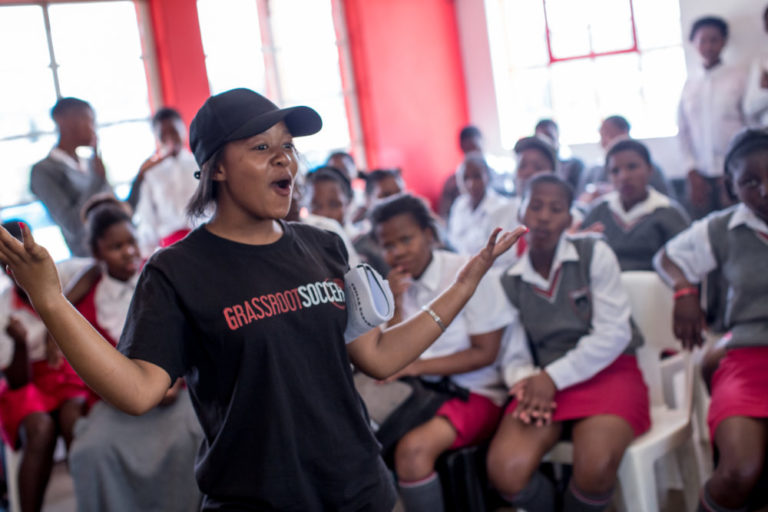365 Days of Activism to Prevent Violence Against Women and Girls
Sexual violence and disempowering gender norms are often instilled at a young age and define what is expected and accepted in adulthood. In South Africa, these power imbalances result in severe consequences including widespread acceptance of violence against women, transactional and age-disparate sex, and early exposure to sex.
Each year, the 16 Days of Activism for no violence against Women and Children campaign focuses on the elimination of violence against women and girls. This year, Grassroot Soccer is calling not only for 16 days, but for 365 days of activism to combat gender-based violence in South Africa and beyond.
The 16 Days of Activism for No Violence against Women and Children is an international awareness-raising campaign held every year from 25 November (International Day for the Elimination of Violence Against Women) to 10 December (International Human Rights Day).
South Africa adopted the campaign in 1998 as a strategy towards creating a society free of violence. Each year, the campaign raises awareness amongst South Africans about the negative impact of violence against women and girls (VAWG). And each year, gender-based violence (GBV) continues to impact every aspect of life in South Africa.
Across most of the world, gender norms, values, and practices are continuously changing and influencing health-related behaviors and outcomes.[1] However, in many cases, laws do not reflect the reality. This is certainly the case in South Africa.
The South African Constitution is among the most progressive in the world, enshrining the right of women to live free from violence. Despite this, women and children are neglected and abused on a daily basis and due to patriarchal societal norms, the onus of violence prevention is placed on women. At the same time, failures in the legal system discourages the majority of survivors from reporting rape or violence.
As a result, the data – already alarmingly high— are likely far lower than reality. South Africa’s 2016 Demographic and Health Survey, revealed that one in five South African women over the age of 18 have experienced physical violence; Four in 10 divorced or separated women reported physical violence; and one in three women living in the poorest households reported cases of abuse. Rates are the most severe amongst widows (one in five), couples living together (one in three), and women who are divorced or separated (40%).
These staggering statistics reflect both societal attitudes of patriarchy and chauvinism as well as the ineffective efforts among the government and civil society programmes.
Government representatives pay lip service to treating violence against women as a priority, but must also commit the resources necessary for effective violence prevention measures, alongside efficient health and criminal justice services. Initiatives such as the Thutuzela Care Centres and the 16 Days of Activism campaign are laudable but more is required in every sector.
We cannot afford to lose hope in our fight to end violence against women and girls, to engage with perpetrators, and most importantly - to prevent violence before it starts. Research shows that patriarchal beliefs and experiences of childhood violence are the strongest predictors of violence. These patterns unfortunately play out amongst both adults and adolescents. Understanding the generational impact of violence, Grassroot Soccer believes transformation must occur at all levels of society. For this reason, we inspire young men and boys to be partners and activists through our SKILLZ programming – curriculum designed with intention and driven to empower adolescents to lead healthy, positive, purposeful lives.

Grassroot Soccer programming in Alexandra, South Africa
Photo Credit: Karin Schermbrucker (Slingshot Media)
For over a decade, Grassroot Soccer has been an innovative player in HIV prevention through our dedicated community role models, curriculum and use of soccer to break down barriers, building trust and educating young people to adopt healthy lifestyles. The curriculum challenges gender norms by encouraging participants to lead through sport, teaching them about their role in HIV prevention and transmission, sexual and reproductive health and rights (SRHR), and in ending violence against girls and women in their communities. We recognise the link between violence, harmful gender norms and HIV and work to establish partnership and innovative programmes to help us fight these challenges year round.
The 16 Days of Activism for No Violence against Women and Children campaign compels us to unite – in South Africa and across the broader global community – in our efforts to eradicate violence against women and children every day of the year, for years to come.


